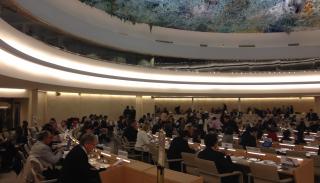
Breadcrumbs navigation
The power of interpersonal relationships: A socio-legal approach to international institutions and human rights advocacy
In this short summary video, author Nina Reiners talks through the key arguments from her new Review of International Studies (RIS) article - 'The power of interpersonal relationships: A socio-legal approach to international institutions and human rights advocacy.'
Want to know more? You can read the full article at DOI: https://doi.org/10.1017/S0260210523000438
This particular article is open access, however BISA members receive access to all articles in RIS (and our other journal European Journal of International Security) as a benefit of membership. To gain access, log in to your BISA account and scroll down to the 'Membership benefits' section. If you're not yet a member join today.
Abstract
This article further develops and illustrates the argument that relationships between individuals help to explain the success of human rights advocacy in international institutions. Drawing from advocacy theory and socio-legal studies, I shift the attention from collective forms of advocacy to the importance of interpersonal relationships of advocates with individuals in international institutions to influence the development of human rights. I introduce a framework consisting of three analytical steps – mapping the key actors in a network, process-tracing, and biographical research – and apply the framework to three cases of norm development by a United Nations human rights treaty body. My findings highlight the power of interpersonal relationships for the making of human rights, and they inform scholarship on transnational elites, human rights advocacy, and the politics of international law.
Top image by Jaurocks via Wikimedia Commons, licensed under Creative Commons Attribution-Share Alike 4.0 International